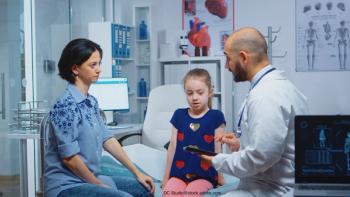
A look at what to expect from Contemporary Pediatrics this week

School readiness can set the course of a child’s education. A new investigation examines how early intervention could improve school readiness for children who are deaf or hard of hearing.

Dr. Tina Q. Tan welcomes the 3 newest members of the editorial advisory board.

A look at what to expect from Contemporary Pediatrics this week

Genital exams to determine whether a patient has been abused or for some other reason can cause discomfort in many pediatricians. A presentation at the virtual 2020 American Academy of Pediatrics National Conference & Exhibition showed how clinicians can overcome this fear as well as what the clinician should do to prepare for such exams.

When discussing technology in pediatrics, it can often seem like it’s only a source of problems. A presentation at the virtual 2020 American Academy of Pediatrics National Conference & Exhibition offers 10 ways that technology can help promote health.

We may have grown used to chemicals being a part of everyday life, but some will cause many parents to worry. A presentation at the virtual 2020 American Academy of Pediatrics National Conference & Exhibition offers guidance on how to address these concerns.

For children experiencing suicidality, a quick and accurate assessment can mean a world of difference. A presentation at the virtual 2020 American Academy of Pediatrics National Conference & Exhibition offers a look at a tool that can help clinicians.

Puberty can be scary for any teenager, but for the transgender teenager it can be an absolute minefield. A presentation at the virtual 2020 American Academy of Pediatrics National Conference & Exhibition sheds light on how to provide appropriate, necessary care to this population.

Adolescents can raise questions of confidentiality and consent to care. A presentation at the virtual 2020 American Academy of Pediatrics National Conference & Exhibition showed how 2 health care systems walk the line to protect their adolescent patients’ right to privacy.

Regular school attendance is important, not only to academic success, but future health outcomes. A presentation at the virtual 2020 American Academy of Pediatrics National Conference & Exhibition offered insight into how pediatricians can help keep students in school.

Alcohol consumption may not be uncommon in adolescents, but it can have an impact on later harms. A new report looks at the trajectories of alcohol consumption.

A look at what to expect from Contemporary Pediatrics this week.

Attention-deficit/hyperactivity disorder (ADHD) is marked by age-inappropriate levels of inattention and activity. A report from Finland examines how relative immaturity in the first years of school could increase the risk of ADHD medication use.

Childhood should be a time of innocence, but for some it means exposure to sexual exploitation. A meta-analysis examines risk factors linked to such exploitation.

A new investigation looks at the modifiable factors that can impact childhood cognitive performance.

No level of exposure to lead is safe and predicting exposure can be difficult. An investigation assesses the effectiveness of a machine learning model in predicting lead exposure.

The current school year will be an unusual one and will present many hurdles for families to cross. The American Academy of Pediatrics (AAP) has some tips to ensure each child has the best school year.

Tablets, smartphones, and apps are a part of daily life for many children. Unfortunately, those same apps could be giving third parties identifying information, according to an investigation.

The influenza season is going to be here soon, which could make things difficult for a system already taxed by COVID-19. A new report illuminates the similarities and differences between COVID-19 and seasonal influenza.

Eating disorders can be devastating and could lead to damage or even death. Can digital cognitive behavior therapy help?

Children zoom all over the place in their play. A new meta-analysis looks at how the cardiorespiratory fitness from that running could impact later life health.

Cancer in adolescents and young adults isn’t common. What symptoms spur a visit that starts the path to diagnosis? A report provides some information.

Stricter minimum age laws have helped improve outcomes for tobacco and other things. Do such laws have a positive impact on firearm homicide rates in young adults?

Endocrine-disrupting chemicals are nearly ubiquitous in day-to-day life. Could they be linked to attention-deficit/hyperactivity disorder-like (ADHD) behavior?

Oral immunotherapy is promising in the treatment of food allergies, but not every patient—and not every physician—can take it on.

The US Food and Drug Administration (FDA) has approved Medtronic’s hybrid closed loop diabetes management device for use in children aged 2 to 6 years.

Diagnosing neonatal seizures can be complicated and difficult. Could an algorithm help? An investigation examines.

Food insecurity has been tied to obesity, but little is known about whether this link extends to infants. A new study looks at whether this connection holds.

Type 1 diabetes treatment has improved dramatically over the years. A new study examines the efficacy of a closed loop system.